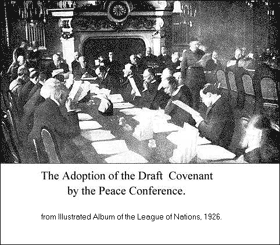Covenant of the League of Nations |
|---|

The initial draft of the Covenant of the League of Nations was completed hurriedly in early 1919, under the close supervision of President Woodrow Wilson. The proposed new international organization was to be composed of three bodies:
- The Secretariat. This permanent body was to be responsible for the administration of League policies and programs and was to be housed in Geneva, Switzerland.
- The Council. The Council was to be composed of nine member nations. Britain, France, Italy, Japan and the United States were to be permanent Council members. The remaining four positions were to be chosen by the Assembly on a rotating basis.
- The Assembly. All member nations were to be represented in the Assembly and each was to have a single vote.
League members were to be pledged to the following, to:
- Protect the territorial integrity of other member states (Article X)
- Submit to the League disputes that threatened war
- Employ economic and military sanctions against nations that resorted to war
- Participate in arms reduction programs
- Assist in the establishment of a Permanent International Court of Justice.
As soon as the provisions of the Covenant became known in the United States, opposition was voiced. Article X received much attention, prompting critics to question the collective security implications of that provision. Few relished the prospect of sending American forces to fight in future European or Asian wars. Other critics believed that the League Covenant would supercede valued traditional policies, such as the Monroe Doctrine.
Other American leaders were more favorably inclined toward the League, but believed it would be unwise to join if provisions were not included for withdrawing at some point in the future.
Woodrow Wilson campaigned hard for ratification of the covenant. He was especially proud of Article 10, as can be seen in this excerpt from a speech in Pueblo, Colorado, in September, 1919:
When you come to the heart of the Covenant, my fellow citizens, you will find it in article ten, and I am very much interested to know that the other things have been blown away like bubbles. There is nothing in the other contentions with regard to the league of nations, but there is something in article ten that you ought to realize and ought to accept or reject. Article ten is the heart of the whole matter.What is article ten? I never am certain that I can from memory give a literal repetition of its language, but I am sure that I can give an exact interpretation of its meaning. Article ten provides that every member of the league covenants to respect and preserve the territorial integrity and existing political independence of every other member of the league as against external aggression. Not against internal disturbance. There was not a man at that table who did not admit the sacredness of the right of self-determination, the sacredness of the right of any body of people to say that they would not continue to live under the Government they were then living under, and under article eleven of the Covenant they are given a place to say whether they will live under it or not. For following article ten is article eleven, which makes it the right of any member of the League at any time to call attention to anything, anywhere, that is likely to disturb the peace of the world or the good understanding between nations upon which the peace of the world depends.
Under the terms of the U.S. Constitution, an international treaty such as the Treaty of Versailles could not take effect unless confirmed by the Senate. Debate over the treaty raged through 1919. Three camps emerged. A bloc of senators known as the Irreconcilables opposed the treaty in any form. On the other side were senators who agreed with Wilson that the treaty should be confirmed as written. In the middle were those like Henry Cabot Lodge who wanted the treaty ratified with reservations.
Lodge`s proposed reservations would have given the United States the right to withdraw at any time on its own terms and to decline participation in any military action initiated by the League. It also asserted the Monroe Doctrine as being above any provisions of the Covenant. Wilson opposed any reservations. No formula could be devised that would satisfy the required two-thirds of the Senate, which failed on March 19, 1920, to confirm the treaty and finally returned it to the White House unconfirmed.
See also Wilson`s Search for Peace.
- - - Books You May Like Include: ----
Woodrow Wilson: A Biography by John Milton Cooper Jr..
The first major biography of Woodrow Wilson in nearly twenty years, from America’s leading Wilson scholar.Woodrow Wilson was one of the most important...
The Monroe Doctrine: Empire and Nation in Nineteenth-Century America by John Sexton.
President James Monroe’s 1823 message to Congress declaring opposition to European colonization in the Western Hemisphere became the cornerstone of n...
The first major biography of Woodrow Wilson in nearly twenty years, from America’s leading Wilson scholar.Woodrow Wilson was one of the most important...
The Monroe Doctrine: Empire and Nation in Nineteenth-Century America by John Sexton.
President James Monroe’s 1823 message to Congress declaring opposition to European colonization in the Western Hemisphere became the cornerstone of n...
No comments:
Post a Comment